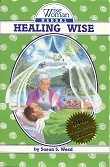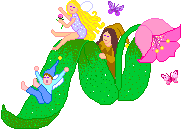Herbal Adventures with Susun S Weed
Brassicaceae family 'aka' Cruciferae (crucifix) family
by Susun S. Weed
read other Herbal Adventures part 1, part 2 , part 3 , part 4
as seen printed in Sagewoman magazine
Herbal medicine is people's medicine; herbal medicine is women's medicine. Most women alive today, everywhere across this planet,  rely on local herbs to keep themselves and their families well. A basic knowledge of herbal medicine helps women -- such as you -- stay free from dependence on drugs and doctors, and gives women -- such as you -- the ability to acquire simple effective remedies at little or no cost.
rely on local herbs to keep themselves and their families well. A basic knowledge of herbal medicine helps women -- such as you -- stay free from dependence on drugs and doctors, and gives women -- such as you -- the ability to acquire simple effective remedies at little or no cost.
You don't have to be an expert to use herbs as medicine. You don't even need to know how to read or write. You can learn as our foremothers did: by breathing in what the plant gives you and breathing out to the plant, and by allowing Nature to school you through day dreams and night visions, trance journeys and spontaneous understandings, by means of taste, touch, smell, and sight, and through the songs of the plants.
But we live in a fast world, and learning from Nature is a slow process. Want a shortcut? Learn a little about botany! Botany is a superhighway that optimizes your ability to understand plants and use them wisely So let's continue our tour of some of my favorite plant families. I'd like to introduce you to the cabbage, or mustard, family.
The cabbage family always makes me smile. It is easy to recognize and most of its members are delicious to eat. That's reason enough to be delighted, but it gets even better. Some cabbage family plants are strongly medicinal, and all of them can prevent cancer.
The cabbage/mustard family used to be known as the Cruciferae (crucifix) family, because their flowers have four petals arranged in the shape of a cross. But now we call it the Brassicaceae family, in honor of its most edible genus: Brassica. (See sidebar.)
In addition to four petals -- which are usually colored white, yellow, or pink -- plants in the Brassicaceae family have four sepals (green parts that protect the flower bud). There are six pollen-producing stamen in each flower: four tall and two short. The female part (the pistil) has a two-chambered ovary which produces seeds in a conspicuous, often upright, seed pod.
Lunaria, or silver dollar plant -- an old favorite for the flower garden -- is a Brassicaceae that's grown not for its leaves or flowers (which are a beautiful shade of dark pink), but for its large, showy, silvery, round membranes: the divider that separated the two chambers of the seed pod. Queen of the Night is another flower garden Brassicaceae; its tall stalks of purple, pink, and white flowers have a swooningly wonderful smell in the evening. It is visited by the hummingbird moth, a sight never to be forgotten. Lucky me; it's a wildflower where I live. Wallflowers, another old favorite, also in the cabbage family, are prized for their boldly-colored flowers and ease of cultivation.
All species of the cabbage family are very easy to grow, in fact; they need only cool soil to germinate in. Even poor, dry, clayey soils can produce big crops of Brassicaceae plants. Humans have been cultivating the Brassicaceae for such a long time (several thousand years at least), that we have created an enormous number of plants that look different, but are, in reality, just different forms of cabbage.
In previous columns we learned that each and every plant, indeed each thing in nature, has its own specific (species) name. So it is likely to surprise you, maybe even cause you to wrinkle your brow, when I tell you that kale, collards, brussels sprouts, broccoli, cauliflower, kohlrabi, and all cultivated cabbages including red cabbage, white cabbage, savoy cabbage, and "flowering" cabbage are all Brassica oleracea. And although they have different species names now, turnips and rutabagas were once considered Brassica oleracea too. See why this family makes me smile? It's full of pleasant surprises.
The Brassicaceae also make the Chinese smile; they grow thousands of varieties of edible cabbage family greens including bok choy, Chinese cabbage, pak choi, chicli, shungiku, wong bok, pe tsai, and many others. And they, like Europeans, rely on Brassicaceae roots -- turnips, swedes, and the many varieties of radish -- to bulk out their diet.
The Japanese grow and enjoy Brassicaceae roots, too, especially those -- such as daikon and wasabi -- that pack a spicy punch. Europeans and Americans like spicy mustard family plants too, like mustard greens and horseradish, but when they want a "breath of fire" to liven up their weiners or hot dogs, they go for Brassicaceae seeds, not roots, and grind them into familiar yellow "mustard." Mustard plasters -- a mixture of finely-ground mustard seeds, wheat flour and water -- were a favorite folk remedy in the pioneer days, but may blister the skin if left on too long.
Oil can be pressed from mustard seeds, but it is generally poisonous. But rape (pronounced "rah-pay"), a type of mustard seed, was modified to produce an edible oil known as canola oil. Mustard seed oil is the basis of mustard gas, a vicious chemical used in World War One (which caused blistering and burning of the skin and lungs), and the progenitor of today's anti-cancer chemotherapeutic agents.
Yes, the Brassicaceae family is accepted by orthodox and alternative practitioners alike as an important anti-cancer and cancer-preventative ally. Four servings a week of cabbage family plants reduce overall risk of cancer by half. That makes me grin. What fun; how easy; and how kind to the budget.  The cabbage family offers us a different cooked* green for every night of the week and then some, including the darling of high society: watercress. Its botanical name -- Nasturtium officinale -- is rather confusing; watercress is not even related to garden nasturtium, Trapaeolum majus.
The cabbage family offers us a different cooked* green for every night of the week and then some, including the darling of high society: watercress. Its botanical name -- Nasturtium officinale -- is rather confusing; watercress is not even related to garden nasturtium, Trapaeolum majus.
Herbalists rejoice when they see shepherd's purse, or, as one of my students prefers to call it, shaman's pouch. This small cabbage family plant packs a big wallop when tinctured. I harvest the above-ground parts of the plant -- including leaves, stalks, seed pods and flowers -- and tincture it in 100 proof vodka for six weeks to make a remedy that slows and stops menstrual, menopausal, and post-partum hemorrhages. Midwives tell me that a dropperful under the tongue can stop profuse bleeding in seconds.
Are you smiling yet? You will be if this introduction encourages you to get chummy with the delicious, useful, friendly Brassicaceae family! I'll be back in the next issue to share more fun with plant families.
* It isn't wise to eat cabbage family plants such as broccoli, cauliflower, kale, collards, and cabbage raw or lightly-steamed. They interfere with iodine uptake and contribute to thyroid malfunction by lowering the rate at which it produces hormones.
Some Medicinal and Edible Brassicaceae
Armoracea lapathifolia: Horseradish (counters sinus problems, gum disease; diuretic)
Brassica chinensis: Chinese cabbage
Brassica napus var napobrassica: Rutabaga, Swede
Brassica nigra: Black mustard (seed plaster counters lung congestion, joint pain)
Brassica oleracea var acephala: Kale, Collards (counters cancer; builds bones)
Brassica oleracea var botrytis: Cauliflower (counter colon cancer)
Brassica oleracea var italica: Broccoli (counters cervical, colon, lung cancers)
Brassica oleracea var gemmifera: Brussels sprouts (counters cancer)
Brassica oleracea: Cabbage (protects against radiation; juice heals ulcers, acne, colds)
Brassica oleracea rubra: Red cabbage (counters cancer, lowers cholesterol)
Brassica rapa: Turnip, Field mustard, Broccoli di rappe (counters cancer)
Brassica sylvestris: Wild cabbage
Barbarea vulgaris: St. Barbara's cress, Yellow rocket (wound healer)
Capsella bursa-pastoris: Shepherd's purse (anti-hemmoragic)
Cheiranthus cheiri: Wallflower (emmenagogue, cardiac stimulant, nervine)
Dentaria diphylla: Toothwort
Eruca sativa: Arugula, Rocket
Hesperis matronalis: Dame's rocket; Queen of the Night (diuretic, diaphoretic, expectorant)
Lepidium sativum: Garden cress
Lepidium virginicum: Poor person's pepper
Nasturtium officinale: Watercress (aphrodisiac, contraceptive, laxative, nervine)
Sinapis alba: Yellow mustard (plaster counters chronic pain)
Sisymbrium officinale: Singer's Rocket, Hedge mustard (counters laryngitis, colds, canker sores)
Dear Susun,
I hope you don't mind my writing to you. I am filled with anxiety all the time, about everything. I'm afraid to be alone, but more afraid to be with anyone else. I'm worried that I will say the wrong thing or do the wrong thing. I know I must be eating the wrong things, but I can't seem to figure out what I should eat. I'm scared that I'll get cancer, or be in a terrible accident. Sometimes I can't sleep what with all the fearful things going on in my imagination. Is there anything I can do to feel a little better?
Adrianna from Atlanta
_____________________
Dear Adrianna,
Yes, the world is a scary place, and more so for women. There are terrors lurking in our minds and in reality. But fear freezes us; it doesn't make us safer. Here's what I do to be at ease in an uneasy world.
First, I drink oatstraw infusion (Avena sativa), at least two quarts a week. This strengthens and tonifies the nervous system, calms the mind, and soothes hyperactive nerves. To make it: Put one ounce of dried oatstraw (by weight) in a quart jar; fill to the top with boiling water. Put on a tight lid and let it steep for at least four hours. Then strain the liquid from the herb, squeezing well, and drink hot with honey or over ice. Refrigerate what you don't drink, but do consume it within the next twenty-four hours.
Second, I invite my friend motherwort (Leonurus cardiaca) to go everywhere with me. A daily dose of a dropperful of tincture made from the fresh flowering plant, taken morning and night, provides a strong, secure emotional base. A dose of 5-20 drops, taken as needed, brings calm to overheated and supercharged situations. I find it exceptionally useful to help me calm down when nothing has happened yet but my imagination is doing its best to scare me senseless.
Third, I turn my anxiety into anger. Anger gives me energy to take care of myself so my anxious fantasies don't come true. Anger give me energy to work toward changing the things that scare me, particularly violence against women. Anger burns away my anxiety and frees the Amazon inside every woman. Yes, it is a little scary to be angry, but you have nothing to lose since you are anxious anyway. Give it a try. Scare your fears away!
 Green blessings. Susun
Green blessings. Susun
Healing
Wise
 by Susun
S. Weed
by Susun
S. Weed
Introduction by Jean Houston.
Superb herbal in the feminine-intuitive mode. Complete instructions for using common plants for food, beauty, medicine, and longevity. Seven herbs -- burdock, chickweed, dandelion, nettle,
oatstraw, seaweed, and violet -- are explored in depth.
A Special Tenth Anniversary edition of this
classic herbal, profusely illustrated. 312 pages.
Retails for $21.95
Read a Review
Order HEALING WISE in our Bookshop
I just started reading your book, Healing Wise. Your
humor and approach to life seem so "down-to-earth",
just like your favorite powerful weeds. Thank you for sharing
and nourishing.! ~ Diane







